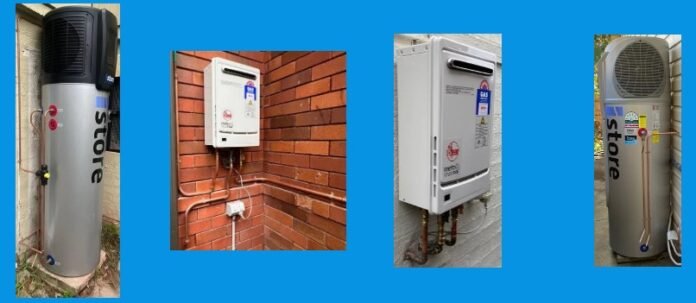Introduction:
Welcome to the ultimate guide to choosing the right hot water system for your premises. It is so important that the right hot water system is selected to meet the needs of its owner and that it is selected to meet the requirements of the installation.
Choosing the correct hot water system for your property whether it is for domestic, commercial or industrial use can save you countless time and money. An efficiently running hot water system doesn’t just cost less in energy but is also better for the environment.
Your plumbing system depending on how it is set up may need a specific hot water system so just going out and buying the first system you see without doing any research or speaking to a plumbing professional could be detrimental.
4 Types of Hot Water Systems:
1. Tankless (Instantaneous) Water Heaters
A revolutionary innovation, tankless water heaters are designed to instantly heat cold water using gas or through a specialised set of super-heated coils.
This advanced mechanism guarantees an uninterrupted flow of hot water, eliminating the need for storing it in a traditional tank.
Notably compact, these water heaters occupy a fraction of the space required by conventional tank-based models. This makes them particularly well-suited for compact living spaces like condos, apartments, or townhouses.
2. Storage Tank Water Heaters
Typically, tank water heaters are energized by electricity or natural gas, although there are instances where liquid propane or oil may also be employed.
As cold water enters the tank, it undergoes heating until it attains the predetermined temperature. Once the water inside the tank reaches the desired temperature, the water heater discontinues active heating.
When the hot water is dispensed or a certain interval has elapsed, prompting the water to cool down, the unit reactivates to reheat the water to the pre-set temperature.
3. Solar Water Heaters
Harnessing the sun’s energy, a solar water heater stands as a smart strategy for curbing annual utility expenses. This system employs the sun’s radiance to warm water, showcasing its environmental and economic benefits.
Characterised by a generously sized insulated tank similar to conventional tank water heaters, solar water heaters stockpile water until it’s ready for use. However, the differentiating factor lies in their utilisation of solar panels to harness solar energy, which is then converted into electricity for water heating.
4. Heat Pump Water Heaters
These innovative water heaters compose mostly of an insulated tank, mirroring the storage concept of traditional tank water heaters. However, their distinctive feature lies in harnessing ambient warmth through a heat pump mechanism, effectively transforming it into energy to heat water.
Their operation involves absorbing heat from the air, which is then transferred to the water within the tank. This process is bolstered by a supplementary heating system, guaranteeing hot water availability even in less favorable conditions.
Hot Water Systems – Factors to Consider:
● Tailored Capacity for Your Home:
- Tailor your system’s size to match household occupancy, ensuring an ample and efficient hot water supply.
● Energy Efficiency Insights:
- Delve into energy efficiency comparisons to make an eco-conscious and cost-effective choice.
● Fuel Options Aligned with Economy:
- Explore electric, gas, propane, and solar alternatives, selecting the most economical and accessible option.
● Balancing Initial Investment and Savings:
- Strike the right balance between upfront costs and long-term savings to make a financially strategic decision.
● Space and Climate Compatibility:
- Evaluate available space and consider climate influences, optimizing both installation and system performance.
Hot Water Systems – Balancing Pros and Cons
1. Tankless Water Heaters:
Pros:
- Instant gratification, offers on-the-spot hot water, eliminating storage wait times.
- Space savvy, compact design suits snug spaces, excellent for cozier homes.
- Positive energy economy, operates only when needed, curbing energy waste.
Cons:
- Initial costly investment, Installation expenses might surpass traditional setups.
- Multitasking constraints, and handling simultaneous high-demand usage could be a challenge.
2. Storage Tank Water Heaters:
Pros:
- Budget-friendly, generally wallet-friendly in terms of purchasing and setup.
- Time-tested reliability, established technology with a widespread user base.
- Handling multiple requests, and simultaneous usage across appliances is feasible.
Cons:
- Negative energy economy, constant reheating, irrespective of usage patterns.
- Space-restricted, occupies more room than its tankless counterparts.
3. Solar Water Heaters:
Pros:
- Sun-powered green energy harnesses solar energy for reduced reliance on conventional sources.
- Financially savvy, long-term utility bill savings contribute to the overall economy.
- Environmentally friendly, lowers the carbon footprint, embracing eco-friendliness.
Cons:
- Upfront financial costs, Installation expenses might require a deeper investment.
- Weather-driven performance, cloudy days could dim efficiency.
4. Heat Pump Water Heaters:
Pros:
- Energy savvy, capitalises on ambient warmth for reduced energy draw.
- Cost-effective path, diminished operational expenses translate to money saved.
- Compact unit suited for space-challenged environments.
Cons:
- Financial onset, initial costs might outweigh those of conventional models.
- Climate factors, cooler climates could affect performance efficiency.
Thank you for reading the article on the guide to choosing the right hot water system for your premises.
We hope this has been a beneficial read and that if an intricate repair or installation is on the cards it is recommended that you consult your professional local plumber to get the job done correctly and safely.
Jonson Morrissey








